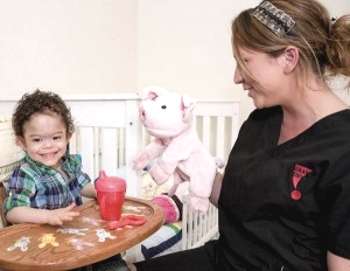Featured Expert:
Childhood is an amazing time full of growth and learning. The period comes with a lot of “firsts” as children learn new skills. While these skills develop at different rates for each child, there are developmental milestones that children are expected to reach by certain age ranges. These milestones help children develop as they get older.
For some children, injuries or medical conditions may affect their ability to achieve their developmental milestones. In these cases, they might need additional help. Home-based occupational therapy is conveniently offered to treat children from infancy to adolescence. Pediatric occupational therapist Joan Jung-D’Amico explains how treatment helps children reach their full potential and achieve age-appropriate skills for their environment.
What is occupational therapy for kids?
Pediatric occupational therapy helps children improve their ability to do everyday activities and meet developmental milestones. Occupational therapy provides support for both physical and social-development needs. Parent education and continuous practice are important parts of the treatment process. Common treatments include working on feeding skills, developmental milestones, social skills, fine motor skills or hand-eye coordination.
Why would a child need occupational therapy?
Children are referred to pediatric occupational therapy when they have conditions or injuries that affect their development. Some children receive to treatment because they are having trouble reaching developmental milestones. Others may need occupational therapy because an injury or condition is keeping them from activities they were once able to do.
Pediatric occupational therapy is a common treatment for children with:
- Prematurity
- Autism
- Down syndrome
- Dyslexia, dyscalculia, and other learning or sensory processing disorders
- Congenital cardiac disease
- Oral aversion/feeding disorders
- Plagiocephaly
- Fine motor issues
- Cerebral Palsy
- Cancer
Pediatric Occupational Therapy Treatments
Pediatric occupational therapy treatments maximize children’s potential and help them reach age-appropriate activities. Therapy plans are unique to each child, depending on age, condition and need. Treatment can look vastly different for each child. For infants and toddlers, treatment may focus on feeding ability and delay in milestones. Older children are more likely to focus on fine motor skills, eye-hand coordination and play. Treatment for injured children emphasizes returning them to sports or other daily activities.
Occupational therapists evaluate and create a treatment plan that is tailored to the needs of the child and their family. “Treatment has to vary in all of our sessions to really focus on each child’s challenges,” says pediatric occupational therapist Joan Jung-D’Amico. Pediatric occupational therapy is often family and goal-oriented. Therapists collaborate with families to identify their greatest needs and incorporate those into treatment.
Home-based occupational therapy is typically intended as transitional care. “Depending on their needs, we help children get ready for long term services or to return to their school setting,” explains Jung-D’Amico. Children that need more care are often referred to outpatient therapy or an early intervention program.
How can children benefit from in-home pediatric occupational therapy?
Specialized In-Home Care
Home-based rehabilitation therapy allows therapists to tailor treatments in ways not possible in clinical environments. Therapists see the home environment and how children interact with it firsthand. “A family in the hospital can describe their house but actually seeing it in person and being able to be in the home — we can’t recreate that,” says Jung-D’Amico. Using this information, therapists develop treatment plans that really take the home setting, family dynamics and child’s temperament into account. The pediatric occupational therapist can use the child’s favorite toys, work in a favorite room and have parents assist in treatments to motivate the child into achieving their goals.
Emphasis on Family Education
Parent education has a larger emphasis in home-based care. “Because we are in the home we can take the time to talk to families in-depth about not only their needs and concerns, but also the treatment plan needed to achieve these goals,” says Jung-D’Amico.
To get the most out of occupational therapy, children and families are encouraged to continue practicing the recommended exercises and activities outside of sessions. The therapist then discusses concerns and progress with the family and adjusts the treatment plan as needed. While parental education is completed in clinical and hospital settings, Jung-D’Amico says it has a larger emphasis and impact in home-based care. “The family is the only focus in the home so we can really emphasize on having the patient develop, thrive and become as independent as possible,” she states.
Conditions in children treated with home programs
Occupational therapy home programs also require a conceptual base for effective treatment like any other therapy. The family-centered practice service approach broadly supports home programs of occupation therapy. It enables parents to deliver the treatment from their home instead of inside a clinic, which translates to greater participation and receptiveness. [5] Children with the following medical conditions may benefit from home-based occupation therapy: [1]
-
Cerebral palsy
-
Autism spectrum disorder
-
Attention deficit hyperactivity disorder
-
Behavioral disorder
-
Sensory processing disorder
-
Learning disability
-
Fine motor delay
-
Gross motor delay
-
Feeding problem
What are the benefits of using home programs for children?
Occupational therapy home programs have several advantages. Improved access to therapy sessions and reduced wait times at the clinic are notable benefits. Through virtual sessions, therapists can educate and train parents on how to execute homework exercises effectively for their child. [2]
Ultimately, home programs allow the child to feel safe and comfortable to do the activities that can improve their well-being and health. Families participating can also help better manage the therapy, too. [6]
Here are the benefits of home program occupational therapy as a parent:
-
It’s cost-effective: Home-based sessions can save money because there is minimal to no travel, greater patient satisfaction, and parents can work around their schedule resulting in less missed work. [6]
-
Therapy is catered to a child’s daily home life: Home occupational therapy is more individualized, catering to specific needs such as comfort and timing, and can become a part of the daily routine at home. [7]
-
Your child’s participation can improve: Children with developmental disorders like autism or attention deficit hyperactivity disorder (ADHD) receive immense benefits from occupational therapy at home. Studies published in the American Occupational Therapy Association journal and the British Journal of Occupational Therapy suggest that in a home-based setting, parents feel more capable and experience more children’s participation in daily living activities. [8],[13]
-
It saves you and your child time: Home occupational therapy rules out the need for any additional sessions to teach patients. [9] Virtual sessions through interactive video conferencing, also known as telehealth, saves the parent travel time and gives them more flexibility. It also enables the therapist to deliver effective care and therapy to the patients with the involvement of parents during daily living activities. [10]
-
Motor learning becomes more effective: With home program exercises designed to be a part of daily routine, it ensures your child can repeat tasks and maintain the intensity of the exercises, thereby improving effective motor learning. [9]
-
Retention of therapeutic intervention: In the home setting, your child can undergo more treatment exercises as part of their day-to-day activities. This can help them retain the established intervention effects and impact to their development.
-
Foster therapist-parent-child relationship: The involvement of parents empower them to support the well-being of their child. The relationship between the therapist-parent-child can also be improved and enable the child to be receptive to treatment. [9]
-
Therapeutic progress can be interruption-free: Parents tend to opt for weekly sessions for in-clinic treatment. The breaks from therapy between sessions can result in a less effective and possibly more disruption in a child’s progress. With at-home programs, there is less disruption and more frequency in treatment. Therapy can achieve greater effectiveness as it becomes part of your child’s daily routine. [4]
-
Family-centered approach: The occupation therapy in home settings is primarily collaborative, evidence-based, family-centered compared to a school setting and improves the quality of life of children with disabilities. [5],[6],[11]
-
Your child becomes more compliant: With a familiar environment, children can be more receptive and compliant to in-home health programs and activities. [5] A study in children with Down syndrome showed improved adherence to the occupational therapy home program. [12]
Conclusion
Home-based occupation therapy is vital to occupational therapists as it can be valuable to the intervention programs. The occupational therapists can design a child’s treatment plan and activities based on their home settings.
More organizational support is necessary for better education and training to overcome the implementation challenges in home-based occupation therapy for children. Therapists can connect through virtual sessions using connective technology such as video calls through smartphones and laptops. The therapist can monitor the progress virtually through feedback forms or observations. Therapists can, then, train parents to assist their children in treatment activities. They help the parents make adaptive arrangements to ensure effective participation in their child as part of their daily routine.
Kinspire Can Help
Looking to set up shop with home-based programs for your patients? Kinspire makes developmental therapy accessible, affordable and do-able for families and occupational therapists like you!
KidsCare is a wonderful agency with therapists who are changing the world one child at a time. We have had the pleasure of working with Ms. D who I consider an angel walking this earth. She is an exceptional therapist who has been the reason for my son’s progress. He is doing so well and my heart is so thankful. If you are looking for an occupational therapist who is AMAZING it is Ms. D. She is the true definition of everything you want and need. We have been with her for slightly over a year and she has changed our lives. Our son has also worked with speech therapists at KidsCare who have also made a huge difference. The therapists with this agency are flexible and caring.
Sylvia Rocio
My Son (4yrs old) and I are currently clients of KidsCare and Taylor is our Speech Therapist. We reside in Garland,Tx and have welcome Taylor as our family. KidsCare is always on top of things when it comes to the care of their patients. Communication is always timely, effective, and follow up on previous contacts. Samantha is Taylor’s supervisor and does my sons evaluations and is awesome! My Son LOVES Taylor and adjusted perfectly as soon as she entered our lives. I am always comfortable and confident in the care she gives him. As long as he needs therapy, we will always be clients of kidsCare and pray Taylor can be our therapist. WE LOVE YOU TAYLOR!!!! You are out of this world AWESOME!! ❤️
Aletra Peaches
My son loves his therapist. In the short time that he has been visiting our home I have seen so much improvement, and I can’t wait to see all the progress in the future as my child grows and learns. It’s scary when someone you do not know comes to your home and is going to work with your child. I was worried and unsure how they would interact and if my older child would feel left out. To my surprise all of my worries/questions had gone right out window after just 1-2 visits. He includes my 3 yr old daughter in their activities and the dynamic between the three of them is so fun to watch. If you are looking for the right therapist for your child, I highly recommend KidsCare.
Lyndsey Obrien
We found KidsCare speech therapy based on the recommendation from our pediatrician. At first to be honest I was disappointed that they don’t take our insurance however I am very happy with the service and flexibility. Our therapist Whittney is amazing. My son has completed his second session and we can already see a big difference in his confidence. So in spite of everything financial- we are very pleased and would highly recommend their services.
Tinnifer Cowey
I am so thankful for the care my daughter has received from her therapy Kaity. She is amazing and my daughter loves her. We recently had a major breakthrough the almost brought me tears and we all celebrated. As a mom, it’s priceless to have someone that you can trust to empower your child. With so much success, our sessions are nearly coming to a close and it’s bittersweet. Thanks!
Teia Jones



